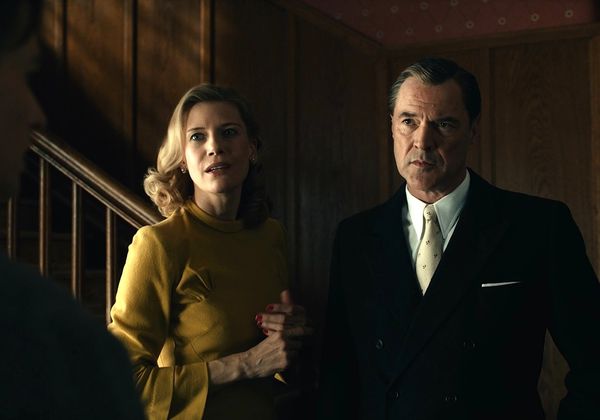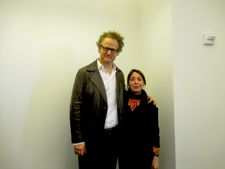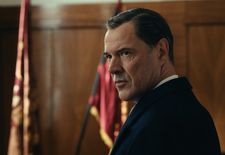Elements from Gerhard Richter’s life story inspired the role of Kurt Barnert, played by Generation War and Jan Ole Gerster's Oh Boy (aka A Coffee In Berlin) star, Tom Schilling, in the latest film from the director/screenwriter of the Oscar-winning The Lives Of Others. In Never Look Away (Werk Ohne Autor), Germany's Oscar submission for the 91st Academy Awards, Florian Henckel von Donnersmarck sets the bar far higher for himself than he did for his Hollywood misfire The Tourist, starring Angelina Jolie and Johnny Depp.
Paula Beer (wonderfully subtle in Christian Petzold's Transit and François Ozon's Frantz) plays Ellie, Kurt’s love interest and daughter to the monster father Professor Seeband (Sebastian Koch) and mother Martha (an outstanding Ina Weisse). Ellie is chosen by the artist because she resembles his beloved aunt Elisabeth (Saskia Rosendahl), who, incidentally and without anyone but the audience knowing, was sent to the gas chamber by Ellie's father.
In a most audacious and questionable montage, the camera (cinematography by Caleb Deschanel) enters the gas chamber with the aunt and the group of women with her, Händel on the soundtrack, while the naked women collapse and suffocate. The film intercuts to bombs falling on Dresden, as well as soldiers, Kurt’s uncles, falling in battle at the front. A choice by the director that is hard to forgive and forget.
Not only do we follow little Kurt’s (Cai Cohrs) life story from his first museum visit with his aunt Elisabeth to the Entartete Kunst (Degenerate Art) exhibition in Dresden in 1937 (the year change is claimed as dramatic license, the exhibit opened there in September 1933), through the war, into life in East Germany and arriving at artistic breakthrough at the art academy in Dusseldorf - no, we also experience numerous mini-lectures on what real art is, how monstrous Nazi doctors destroyed creative potential, and what movie ecstasy looks like.
In another scene, Kurt sits in a tree on a green German meadow and suddenly understands what art is and what holds the world together. Is it apple juice? We’ll never know.
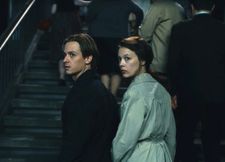 |
| Kurt Barnert (Tom Schilling) with Ellie Seeband (Paula Beer) going West in Never Look Away |
At Sony, overlooking Madison Square Park, Florian Henckel von Donnersmarck in our conversation on Never Look Away told me that "that very tree may have been painted by Caspar David Friedrich."
Anne-Katrin Titze: Kurt has an epiphany while sitting up in a tree. And he says he suddenly understands everything. Of course, that doesn't last, epiphanies like that. Did you ever have a moment like that?
Florian Henckel von Donnersmarck: I think everybody had moments like that. I think that's what being a teenager is about, having that feeling of understanding everything. And as a teenager, it might even be true. When you think, now everything is possible. And then, yes, we lose that along the way, as you say.
AKT: Was yours in a tree?
FHvD: Well, in America often we hear that people say - oh, you have to be in touch with your inner child. I think, what's much more important than being in touch with the inner child is being in touch with the inner teenager. Because that's kind of relevant to our lives. If we could remind ourselves of that.
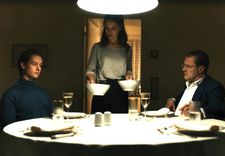 |
| Kurt (Tom Schilling) with Ellie (Paula Beer) and her father Professor Seeband (Sebastian Koch): "Can I never break free? Will he always be dominant in our lives?" |
AKT: It might be too dangerous for some?
FHvD: Interestingly, if you look on Gerhard Richter's website, he describes a kind of epiphany experience like that. You know, my agreement with him was that I wouldn't say things that aren't a matter of public record.
That's why I point you to the website, because he actually has that on there now. I think that that's something that you will find in the life of a lot of people working in, I want to say, our field. I bet if we go into your life, Anne-Katrin, we will also find something like that.
It could be that we forget that moment, but where you suddenly feel the limitlessness of possibilities within human existence. In a way that is what artistic expression is about also. Not accepting the limits that convention and average places on us, you know? Art has to be in every possible way extraordinary. It has to try and go new ways, it has to explore new horizons.
And that's what being a teenager is all about. And if you combine the spirit of the teenager with the experience, craft, and position of an artist - well, then you have people like Picasso, or probably Richter.
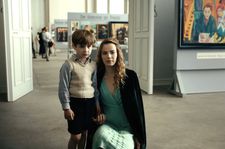 |
| The young Kurt (Cai Cohrs) with his aunt Elisabeth (Saskia Rosendahl) |
AKT: I can relate to the tree, it happening while climbing a tree.
FHvD: The tree was also wanting that landscape. That landscape is exactly the landscape of Caspar David Friedrich. That very tree may have been painted by Caspar David Friedrich. And yes, I used to do that a lot as a youngster. My first kind of reading experiences were always - we would go to my mother's sister in the countryside.
I wasn't really into being in the countryside. I'd just take a book. At that time I was really into Dostoyevsky and I still remember so clearly going out there, reading Crime And Punishment. You know, in a tree! Way out, not wanting to be disturbed by all these country activities we were supposed to do. And just thinking, okay, this is complete happiness.
I remember I had this feeling as a young person when I read great works or saw work of great artists, I thought, my goodness, this person expresses exactly what I feel. I must be the reincarnation of that person! So I was completely convinced that I was the reincarnation of Fyodor Dostoyevsky. I thought, we even have the same initials, FD! That must mean something!
AKT: Of course! I just want to mention one of your actors - Ina Weisse. I thought her performance was great.
FHvD: I think so, too! She's a wonderful actress.
AKT: As Martha Seeband, the professor's wife, you can see everything on her face. She does not want to be with this man [Sebastian Koch as Carl Seeband], but she is with this man.
FHvD: I'm so glad you picked up on that. That's really, really good. You know, not one person has mentioned that before and I completely agree with you. I saw that so clearly in everything she did, exactly that thought. Great, thank you. I'll tell her that. She'll be happy to hear that because she put a lot of effort into that. And it's exactly that.
I think one important message, I'd say almost - although I don't know if message is the right word in the movie - is this whole thing of, look, how terrible the position of women was in these kind of situations. You can sense she has a different spirit but yet she is so subjugated by everything that she can't even dare to live it. Sometimes she'd even suddenly talk the way he wants her to talk.
The same thing with the daughter [Paula Beer as Ellie], she says "Can I never break free? Will he always be dominant in our lives? Can we never get rid of him?" At the same time, when he stretches out his hand to take it, she gives it to him. Almost because she's programmed now. And I think a lot of that is in Ina's performance. So I'm glad that you point that out.
Coming up for the US release in January 2019 of Never Look Away by Sony Pictures Classics, Florian Henckel von Donnersmarck on his editor Patricia Rommel, his defense of the gas chamber montage with Händel on the soundtrack, the loss for a little boy, a Milan Kundera essay, and Florian's family background.








